Maska visiting the Mousonturm Frankfurt Book Fair 2023

One of Maska’s central aims is the interdisciplinary creation of knowledge, whether this takes the form of artistic, theoretical, publishing or educational practices. The first issue of Maska was published in 1920 as the first journal in Europe dedicated to theatre. In the 1990s, the Maska Institute was founded, which relaunched the journal and gradually expanded its activities to include book publishing and artistic and educational programmes. Maska’s artistic productions are particularly well known for being socially engaged, investigative and documentary, and for interweaving politically engaged theoretical and theatrical thought. For Maska, art has always been part of the social fabric, helping to shape reality and opening up the neuralgic points of contemporaneity.
Maska represents a vibrant Slovenian cultural production at the Frankfurt Book Fair 2023 and, in collaboration with Mousonturm, presents a rich programme that combines theoretical writing on art with contemporary artistic production. Bojana Kunst’s newly published book The Life of Art: Crossing the Lines of Care will be the focus of a panel discussion on the Politics of Care, while Pia Brezavšček, editor of Maska journal, will lead an international workshop on contemporary publishing. The rich discursive programme will be complemented by a cross-genre performance of a “theatrical essay” from the series SoToSpeak, Knitting reveries (Bojana Kunst), and a lecture-performance Sex Education II: Ability directed by Tjaša Črnigoj.
18th October 2023 – 22nd October 2023
Künstlerhaus Mousonturm, Frankfurt, Germany
Photo: Joerg Baumann
PROGRAMME
Sex Education II: Ability

Authors: Tjaša Črnigoj, Lina Akif, Tea Vidmar, Tijana Todorović, Barbara Kapelj
Directed by: Tjaša Črnigoj
Performer: Lina Akif
Sound Performer: Tea Vidmar
Music: Tea Vidmar
Visual identity and Costume design: Tijana Todorović
Set design: Barbara Kapelj
Nura’s voice: Katarina Stegnar
Editing audio recordings and Sound design: Jure Vlahovič
Lighting design: Tjaša Črnigoj, Igor Remeta, Manca Vukelič, Barbara Kapelj
Translation: Tina Malič
Production management: Tina Dobnik
Inspicient: Demijan Pintarič
Technical Managers: Manca Vukelić, Igor Remeta
Martina Piskač (together with Uroš Sedej), Nura, Suzana, Tjaša and Linda shared their experiences.
Included are statements by expert-interviewees (Elena Pečarič, Jernej Hazimali and Steven De Weirdt) and excerpts from Elena Pečarič’s essay “So Beautiful, Yet Disabled,” published in the journal Social Work, Volume 44, Issue 1/2.
The project is part of a series of lecture-performances in which Nika Rozman, Sendi Bakotić and Vanda Velagić also participate as authors and performers, Lene Lekše as an author, and Alja Lobnik, PhD Gabrijela Simetinger and PhD Maja Vehar as expert collaborators.
Production: The New Post Office/Nova pošta (Maska Ljubljana and Mladinsko Theatre)
Co-production: City of Women
Thanks:
Lana Akif, Boštjan Bebar, Sendi Bakotić, Urška Brodar, Tina Dobnik, Jernej Hazimali, Urška Henigman, Interdisciplinary research team About feminist pleasure, Alja Lobnik, Tina Malič, Jaka Sotlar, Tibor Mihelič Syed, Borut Laznik, Borut Opetnik, Gabriele Fuso, Klara Otorepec, Elena Pečarič, The Sisterhood of the Proud Dolphin, Žiga Sedevčič, Katarina Stegnar, SVŠGUGL, Vanda Velagić, Steven De Weirdt
Première: 2. 3. 2023
Ability is based on the stories of four women about their sexual coming-of-age, their relationship to their bodies, their sexuality and their relationships. What the four women have in common is that they live with a disability and are thus, as Elena Pečarič says in her essay “So beautiful, yet disabled,” faced with double discrimination, as persons with a disability and as women. In Slovenia, the sexuality of people with disabilities is overlooked at a systemic level and sex education is particularly lacking in this area, while social care workers have discretion as to whether they help women with disabilities with sexual practice, as this is not in their job description.
“In such a stifling atmosphere, a woman with disability literally has to fight windmills to express her sexuality, femininity, well-being or satisfaction with her appearance, herself and her body. […] Why is it so difficult to understand and accept that a woman with disability can be happy with herself or her body as it is, to feel good, to feel beautiful, attractive or sexy.” (Elena Pečarič: So Beautiful, Yet Disabled)
The project is part of a series of lecture-performances named Sex Education II. The series is addressing the topic of sexual pleasure as the fundamental sexual right in the frame of human rights. Lecture-performances shed light on this topic from different points of view. Besides the sexuality and pleasure of women with disabilities, they tackle the notion of consent, the problem of painful intercourse and vaginismus, they enter the world of BDSM and kink, and reconstruct the fight for reproductive rights in Yugoslavia.
The series is based on interviews with women, who shared their personal stories, experience and problems. It is also based on conversations with experts from different fields.
Photo: Nada Žgank
Politics of Care at the Crossroad of Art and Life

Panellists: Valeria Graziano, Elke Krasny, Bojana Kunst, Stefan Nowotny, Gerald Raunig
Moderated by Pia Brezavšček and Alja Lobnik
Care has become one of the central categories in artistic production and curating practice. It is often a category through which more engaged artistic work and more socially and politically aware artistic institutions are articulated. Care is an ethical notion, which is immanent to life, and therefore also to art. But why is care often brought to the fore as an a priori ethical value, or that in itself produces something good? This shift towards care could be seen as a consequence of the many crises we live within, in particular precarity, the ecological crisis, and immense structural inequalities. But does this attention to the relational dimension of care also change how art is produced and happens? On the one hand, care is a constitutive ethical and ontological category, not only for art, but for all of us, all of us involved in relations of care. But this does not mean that we are part of these relations in the same way, that its values are interchangeable and shared. Care is a notion with many contradictions.
In this panel discussion we will discuss and examine those paradoxes and difficulties which arise when art cares. In the discussion, activists, philosophers, artists, and curators will examine different dimensions of the relationship between art and care. The talk is organised as the accompanying program to the German publication of Bojana Kunst’s book The Life of Art: Transversal Lines of Care, in which the author discusses how care unsettles the very life of art, it demands a very different life of art from the one we know it.
On the one side, care in art does not escape capitalist value creation; moreover, it also contributes to the global circulation of artworks, which often disembodies and dematerializes its matter and transforms it into the circulation of good and emancipatory political values. In doing so, it perpetuates inequalities and power dynamics between works and artists, between artistic environments and their geopolitical positioning. This situation creates complex and internally conflicting artistic and living environments. In a way, artistic environments today are thus often just as unsustainable and destructive as other capitalist environments, no matter how politically engaged and diverse they may be.
But on the other side, care has consequences: it deeply unsettles the very way we produce and develop the systems of values around art (from the notion of authorship, institutional protection, freedom, etc.,). If we think of care together with its practical and material consequences and with all its ambivalences, then care brings art to the limits of its social and political role and dismantles art’s role in the processes of power. Care changes how art happens, how it is valued, and how it reaches us, and it also unsettles the relationships between art and life.
Bojana Kunst is a philosopher, dramaturge and performance theorist, a professor at the Institute for Applied Theatre Studies at the Justus Liebig University in Giessen. She was a researcher at the University of Ljubljana and a guest researcher at the University of Antwerp (2002). She was a DAAD guest professor at the University of Hamburg (2009 – 2012). She has lectured and taught seminars, workshops and laboratories in various academic institutions, theaters and artistic organizations across Europe, and has continuously worked with independent artistic initiatives and groups of artists. Her research interests are contemporary performance and dance, art theory and philosophy of contemporary art. Among her books are: Artist at Work, Proximity of Art and Capitalism 2015 (in Slovenian, English, Polish and Danish language) and The Life of Art. Transversal Lines of Care, Ljubljana, 2021 (in Slovenian and German).
Gerald Raunig works at the eipcp (European Institute for Progressive Cultural Policies) as one of the editors of the multilingual publishing platform transversal texts, and at the Zürcher Hochschule der Künste as professor for philosophy. His books have been translated into English, Serbian, Spanish, Slovenian, Russian, Italian, Dutch, and Turkish. Recent books in English: Art and Revolution. Transversal Activism in the Long Twentieth Century, translated by Aileen Derieg, New York/Los Angeles: Semiotext(e)/MIT Press 2007; Art and Contemporary Critical Practice. Reinventing Institutional Critique, London: mayflybooks 2009 (Ed., with Gene Ray); A Thousand Machines, translated by Aileen Derieg, New York/Los Angeles: Semiotext(e)/MIT Press 2010; Critique of Creativity, London: mayflybooks 2011 (Ed., with Gene Ray and Ulf Wuggenig); Factories of Knowledge, Industries of Creativity, translated by Aileen Derieg, New York/Los Angeles: Semiotext(e)/MIT Press 2013; DIVIDUUM. Machinic Capitalism and Molecular Revolution, Vol.1, translated by Aileen Derieg, New York/Los Angeles: Semiotext(e)/MIT Press 2016; Dissemblage. Machinic Capitalism and Molecular Revolution, Vol. 2, Minor Compositions 2022; upcoming: Making Multiplicity, Polity Press 2024.
Stefan Nowotny is a philosopher based in Málaga and Vienna. He received his PhD from the University of Leuven (Louvain-la-Neuve) in Belgium and has taught at various European universities, including Goldsmiths, University of London (2011–2022). He has also collaborated in various research projects of the eipcp – European Institute for Progressive Cultural Policies, such as Transform: The Future of Institutional Critique (2005–2008) or Europe as a Translational Space (2010–2012). Besides scattered teaching commitments he currently works as a free author and translator, with focuses pertaining to the philosophy and politics of translation as well as an institutional analysis of contemporary modes of affectivity, perception and subjectivation.
Elke Krasny, PhD, Professor at the Academy of Fine Arts Vienna. Krasny focuses on concerns of care, reproductive labor, social and environmental justice, commemorative practices and transnational feminisms in art, architecture, infrastructures and urbanism. Together with Angelika Fitz she edited Critical Care. Architecture and Urbanism for a Broken Planet (MIT Press, 2019). Together with Lara Perry, she edited Curating as Feminist Organizing (Routledge, 2023) and Curating with Care (Routledge, 2023). Her book Living with an Infected Planet. Covid-19 Feminism and the Global Frontline of Care (transcript publishers, 2023) focuses on militarized care essentialism and feminist recovery plans in pandemic times.
Valeria Graziano is a visiting lecturer at the Institute for Applied Theatre Studies, Justus Liebig University Giessen and associate researcher at the Centre for Advanced Studies, University of Rijeka. Over the years, she has been involved in a number of participatory research initiatives across social movements and the cultural sector, focusing on the relation between technopolitics, institutional analysis and popular pedagogy; repair and refusal of work; recreation and politics of pleasure. She is one of the convenors of the Pirate Care Syllabus project (a book is forthcoming for Vagabond series, Pluto Press, in 2024) and part of the Management Committee of the COST Action “Toolkit of Care”, as well as a member of the Transversal Institutional Analysis Network. Valeria is currently working on the collaborative project “Snađi Se, Druže / Figure It Out, Comrade!”, an ongoing inquiry on forms of plebeian illegalism.
Pia Brezavšček is a PhD student and self-employed in culture. She was a long-time collaborator of Radio Študent. She was the President of the Association for Contemporary Dance and a critic at the newspaper Dnevnik. In 2019, she became co-editor of Maska magazine and co-editor of the web portal Neodvisni – teritorij sodobnih scenskih umetnosti. She has worked as dramaturg or co-author on performance projects, most recently on a sound play about the maternal myth Ideal.
Alja Lobnik is a PhD student at the University of Ljubljana. In the past years she has established herself as a publicist and critic in the field of performance arts. She has worked for Radio Študent, Kriterij, Amfiteatr, etc. In 2019, she was a member of the jury for the Ksenija Hribar Awards at Gibanica. She has been the President of the Association of Theatre Critics and Theatrologists of Slovenia, is a member of the Committee of the City of Women and a member of the Advisory Group for the Performing or Time-Based Arts at Cukrarna. She has participated as dramaturg or co-author in performance projects. She was co-editor of Maska journal and the web portal Neodvisni – teritorij sodobnih scenskih umetnosti (Independent – the territory of contemporary performing arts), and in 2021 she became the director and artistic director of Maska.
SoToSpeak – a cycle of theatre essays

Essayists: Mija Kramar, Dr. Bojana Kunst, Dr. Gregor Moder, Draga Potočnjak, Marko Radmilovič
Curator: Boštjan Narat
Consultant: Jernej Potočan
Co-production: The New Post Office/Nova pošta (Maska Ljubljana and Mladinsko Theatre) and Moment Maribor
The term essay is used rather loosely in this context and denotes a text with a theoretical basis and a clearly identifiable literary dimension, possibly enriched with a personal touch. Such a text, always original, is the starting point for the work carried out by the author himself. It has thus developed into an extremely interesting platform that explores theatrical practices somewhere on the border between theatre, theory and literature. The 2022/2023 season will see a second edition with six new essayists, new themes and new theatrical and philosophical experiences.
Bojana Kunst: KNITTING REVERIES
Performed by Bojana Kunst and Damjana Černe
“Everything is entangled, which is why you have to be very careful when you start knitting. Count the stitches carefully and make sure they don’t escape from the needle. Once you’ve knitted something, it will be easier, but if you’re not careful, it will fall apart, knot up and you’ll have to count again.” That’s what Oma used to say to little Bojana. So many years later, they are talking again – this time on a theatre stage and at the intersection between feminism, politics, ethics and ecology, in a mix of memory and reflection. Caring is not only an intimate commitment, it is also a political question. In her theatre essay, Bojana Kunst, together with her co-actor Damjana Černe, reflects on it and weaves it with caution, depth and care.
Photo: Matej Povše
The Future of the International Performing Arts Journal

Workshop (1 day × 3 hours) with Pia Brezavšček, the editor-in-chief of the Maska journal
Maska is a performing arts journal which has been around for a long time. In 2020, we celebrated its 100th anniversary and its 200th issue. It has been published continuously since 1985. In the early 90s, it had an ambition to be an international all-European quarterly as Euromaske, but even then, when the scene was much smaller, this seemed ungraspable. Since 2000, Maska has been published bilingually; some claim it was one of the most ground-breaking performance theory journals in the period that followed. Many editors and paradigms have changed since. But like almost every other printed journal, Maska’s future is not certain due to the escalating costs of printing and easy and free access to specialised content on the web. Moreover, scenes are vast and ungraspable and it is hard to have an overview of what is happening.
In the workshop, we will ask ourselves the following questions: what are the scene, the art productions and theory with which a performing arts journal is supposed to be entangled to be internationally relevant? Where are the art and the knowledge produced and how are they, or can they be, distributed? What is the centre of the scene that such a journal should follow and what are its peripheries, concerning the provenance of the journal? How can these peripheral visions bring about new knowledge?
Maska’s recent occupation was the topic of Yugofuturism as a take on inventing the future in times after the end of future – not by way of nostalgia but rather melancholia for the lost times when a future was possible. The perpetual economic crises and the inevitable ecological crisis prevent us from projecting into a time to come. We wanted to redeem that not by revisiting history but by creating a future for the region that lost its internal connections due to the increasing nationalist revisionisms and new European values that also have their centre and peripheries. Is the Yugo just another word for the (global) South and how can these geopolitical centres and peripheries be rethought in relation to the performing arts scene?
A special topic of our discussion will also concern the ecological aspects of the migration or “nomadism” of artists, theoreticians, and other professionals to keep the so-called scene(s) lively. Who can afford (not) to travel? Why is it now, after the pandemic, as we’ve completely hacked distant communication, still essential to meet? Can a journal be this sort of a common place, public space? Why still print on paper today? What are the future possibilities for publishing or even from building a community through publishing? Who are Maska’s future editors, contributors, and readers?
In short: What do we want from a future Maska in times after the future?
Photo: Amadeja Smrekar
TIMETABLE
- FRIDAY, 20.10., Künstlerhaus Mousonturm
11.00 – 15.00
The Future of the International Performing Arts Journal (Workshop)/ Studio 2; Künstlerhaus Mousonturm
18.00
Politics of Care at the Crossroad of Art and Life (Discussion) / Studio 1; Künstlerhaus Mousonturm
21.00
Sex Education II: Ability (Lecture performance on women’s sexual pleasure)/ Main Hall; Künstlerhaus Mousonturm
- SATURDAY, 21.10. Künstlerhaus Mousonturmfrom
19.00
Bojana Kunst: Knitting Reveries (SoToSpeak – a cycle of theatre essays)/ Main Hall, Künstlerhaus Mousonturm
*The Maska Publishing stand will be open 1 hour before and after Maska events / Studio 2













